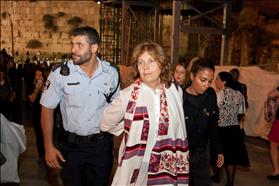Western Wall for all?
Arresting WOW Leaders is not the Answer
On October 16th, Anat Hoffman of "Women of the Wall"was arrested as she led a monthly Rosh Hodesh prayer service. On November 15th, six WOW leaders were detained while they prayed at the Western Wall. The time has come to face the bigger picture.
24/10/2012 00:25
Tags: Orthodox Judaism · Religious freedoms · Gender Discrimination · Jerusalem and Haredim

WOW Leader Anat Hoffman arrested on October 16th, 2012. Photo: Michal Fattal
On November 15th, six women from "Women of the Wall" were detained during their monthly Rosh Chodesh service. This stirs painful memories of October 16th, where Anat Hoffman of "
Women of the Wall" was arrested as she led a monthly Rosh Hodesh prayer service at the Western Wall. Although Hoffman had been arrested before under similar circumstances, that time was particularly brutal, hinting that the police intended to send a message of intimidation to Hoffman and women who wish to pray freely at the Western Wall. It is over the excessive force used by the police and the demeaning and unjustified arrest of Anat Hoffman that Jewish groups all over the world, including many Orthodox Jews, have denounced both the arrest and the governmental policy denying the women the right to worship at the Wall.
Currently, Israeli law bars women from praying while wearing a prayer shawl (tallit) or phylacteries (tefilin) publicly at the Wall. Although this law was challenged in 2003, the Israeli Supreme court upheld it, claiming that the “local custom” was against such practices. The Women of the Wall, in defiance of the law, continued to pray at the site in small groups once every month.
Although their monthly Rosh Hodesh services have caused similar disruptions in the past, Jewish groups including the Women’s Rabbinic Network, the National Council for Jewish Women, and Hadassah came out this time and voiced their support for the right of women to pray at the wall, through realizing their religious freedom and equality as women.
Since the Western Wall was tightly controlled by ultra-Orthodox authorities, pluralistic groups had to come to a compromise, which required that they hold their services at a separate location, well out of the view of the general public. When Rabbi Uri Regev, Hiddush President, served as a member of the “Ne’eman Committee” this very issue was raised. Although in the minority, Rabbi Regev was one who supported the right to pray as one wished and opposed the limitations of pluralistic groups to the area of Robinson’s Arch, adjacent to the Southern Wall.
"As emotionally attractive and justified as Women of the Wall is, there are bigger and more compelling issues like legalizing non-Orthodox Jewish marriage in Israel or funding non-Orthodox Jewish rabbis"- Rabbi Uri Regev
This fundamental issue of religious freedom at the Western Wall continues, and requires the immediate attention of the Jewish community. To our dismay, this is not an isolated incident when examining the vulnerabilities of religious freedom in Israel. The systematic discrimination against non-Orthodox Jews continues to rear its ugly head through laws such as the one preventing women from praying publicly as they wish at the Western Wall.
Hiddush expresses its clear support for the rights of the Women of the Wall, and strongly protests the substandard behavior towards Anat Hoffman. We call on the International Jewish Community to see the events of the last days as a parable of the urgent need of Jews from all over the world to recognize the problems that exist in the area of religious freedom, and to align themselves with an array of organizations that operate Israel in order to fulfill the promise of Israel’s Declaration of Independence for religious freedom and equality.
We invite you to join Hiddush as we continue the struggle for religious freedom and equality in Israel.
Sign on to the vision today.
JTA: Anat Hoffman's arrest at Western Wall galvanizing liberal Jewish Groups
"As emotionally attractive and justified as Women of the Wall is, there are bigger and more compelling issues like legalizing non-Orthodox Jewish marriage in Israel or funding non-Orthodox Jewish rabbis"- Rabbi Uri Regev